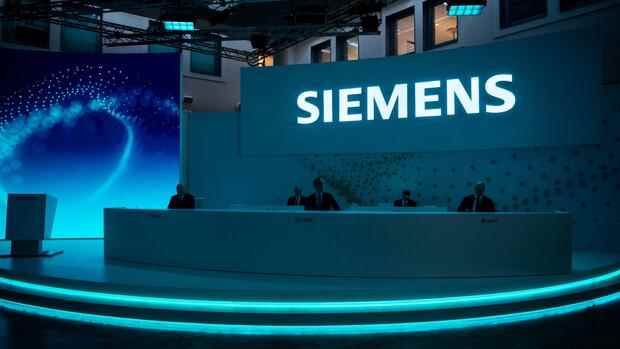In financial circles it is assumed that Siemens could commission a bank with the sales process in the second half of the year.
(Photo: via REUTERS)
Munich, Frankfurt Despite employee protests, the Siemens group made its business with large drives independent. However, a quick sale of the division with around 7,000 employees is not to be expected. In the current environment, a lucrative sale is difficult to achieve, according to financial circles. Siemens is working on the carve-out, but has not yet mandated any banks for a sale.
Around 200 employee representatives demonstrated on Monday in front of the Siemens headquarters on Wittelsbacher Platz against the spin-off of the business. In view of the geopolitical turmoil, the promotion of raw materials such as rare earths has gained strategic importance, said Siemens supervisory board member Hagen Reimer from IG Metall to the Handelsblatt. “The question is whether you want to give something like this out of your hands at this time.”
But the group confirmed that the division, which among other things builds drives for mines, needs more independence and flexibility. In the past, the carve-out of activities that are no longer considered core business was often the first step towards a sale at Siemens.
>>> Read here: Siemens employees take to the streets against the planned spin-off
Top jobs of the day
Find the best jobs now and
be notified by email.
However, that shouldn’t be easy. Many investors were looking for sustainable investments, a banker told Handelsblatt. However, the Siemens division supplies large drives for the oil, gas, chemical and mining industries. It might have been possible to sell such deals to China in the past, but that is no longer so easy today.
In financial circles it is assumed that Siemens could commission a bank with the sales process in the second half of the year. Then you could start around before Christmas. Siemens is in no hurry, because in the current environment, the purchase price can probably only be less than one billion euros. A valuation of about ten times the operating profit seems fair. According to financial circles, this should be between 40 and 90 million euros (Ebitda).
Price pressure from Asian competitors
Technologically, according to financial circles, Siemens does not have a major lead over the competition. The price pressure is particularly high due to Asian competitors.
In industry circles it was emphasized that a sale was only one of several options. The process of becoming independent usually takes about a year.
Siemens itself did not want to comment on the plans. When announcing the carve-out plans, Siemens boss Roland Busch said: “We will give the business for large drives more entrepreneurial freedom so that it can develop even better.”
On Monday, around 200 employee representatives demonstrated against the spin-off of the business in front of the Siemens headquarters on Wittelsbacher Platz.
The large drives are the largest remaining chunk among the so-called portfolio companies (pocs), which are no longer part of the core business. In the past 2020/21 financial year, they generated total sales of around EUR 3 billion and an operating loss of EUR 85 million (adjusted EBITA).
In February, Busch had already announced the sale of postal and parcel automation to the Körber Group for 1.15 billion euros. In addition, the shares in an electric motor joint venture went to the French partner Valeo.
This completes the sales list to a large extent. According to insiders, the large units such as the train technology division Mobility should continue to belong to the group of companies. A further split is not planned by Busch. In the last major step of his corporate restructuring, predecessor Joe Kaeser spun off energy technology as Siemens Energy and listed it on the stock exchange.
More: Siemens Gamesa increases net loss.
